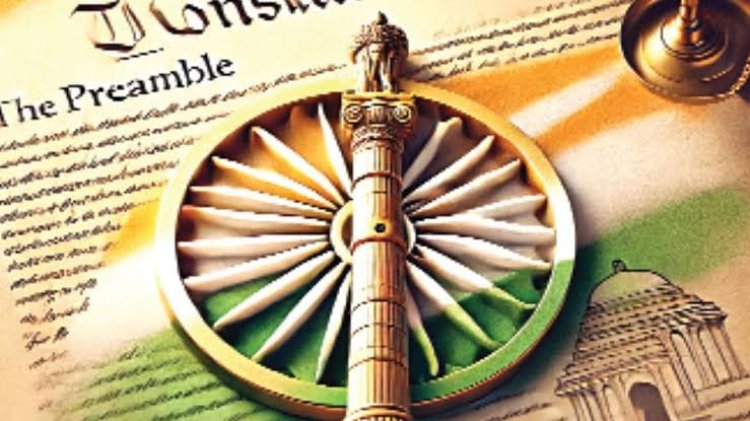Constitution will always win
The debate in both the houses of Parliament on the 75-year journey of the Constitution was very unfortunate and surrounded by allegations and counter-allegations. Yet I am confident that ultimately the strong structure of the Constitution and its progressive spirit will prevail.

26 November 2024, we were celebrating being Indian. In a break from tradition, both the houses of the Parliament discussed for two days the journey of the Constitution over 75 years. Among the good and bad speeches of the leaders, there was not a single speech which even after 75 years could be remembered like the speech 'A Tryst with Destiny' given by Jawaharlal Nehru on 14-15 August 1947 or the speech given by Baba Saheb Ambedkar in the Constituent Assembly on 25 November 1949.
It should be remembered like the speech of Dr. Ambedkar to the government. 75 years ago, the Congress Party was a driving force in the deliberations of the Constituent Assembly. Then Dr. Ambedkar had praised the Congress for bringing order and discipline in the Constituent Assembly. Today the Congress is in the opposition in both the Lok Sabha and the Rajya Sabha. This is a sad change, but not irreversible.
Emergency mentality
The image of the Congress in the minds of the BJP and right-wing elements is linked to the Emergency of 1975-77 and the suspension of the fundamental rights of citizens. In truth, this was a black spot in the 139-year history of the Congress, but Indira Gandhi apologised, vowing that the Emergency would never be repeated. The public accepted her apology and sent the Congress back to power with a thumping majority in 1980.
Does Congress have no other contribution in the making of the Constitution and strengthening it? Yes, but these things are rarely brought before the public. 'Article 368' of the Constitution gives the Parliament the power to amend the Constitution. Which is a galvanizing element for the Constitution of any country. A country faces changes from time to time. And the Constitution is constantly lectured by the judges. The Constitution is a living document, which must be molded according to the changing life of the nation.
Constitutional amendments bring strength Had
I spoken in that debate, I would have reminded of some amendments made by the Congress to strengthen the Constitution. Congress made amendments to the Constitution.
It pursues the higher goals set out in the Preamble, especially justice (social, economic and political) and equality (equality of status and opportunity).
The First Amendment Act of the Constitution, 1951 was a legislative move. It provided constitutional protection for reservation for the socially and educationally backward or scheduled castes and tribes. If this first amendment had not been made, the entire system of reservation would not have been established.
The First Amendment to the Constitution added Articles 31A and 31D and paved the way for the abolition of the Zamindari system, which liberated millions of peasants and agricultural labourers and also facilitated land reforms and land distribution.
The First Amendment laid the legal foundation for public sector undertakings to carry on any trade, industry, business or service with the complete or partial exclusion of citizens.
The Constitution (42nd Amendment) Act, 1976 52nd Amendment Act, 1946 was amended to make several changes to the Constitution. However, few people remember that two changes were made that will be remembered by future generations. The first was the insertion of Article 39A to legally bind the State to provide 'free legal aid' to ensure equal justice. The second was the insertion of Article 48A, which made it obligatory for the State to protect and improve the 'environment' and safeguard forests and wildlife. The Constitution (52nd Amendment) Act,
1985 introduced Article 10, the first attempt to deal with the problem of lawlessness among sitting legislators. Sadly, it did not anticipate the cunning of elected legislators, the collusion of Speakers and the confusing decisions of courts. Article 10 will not serve its purpose unless it is amended again.
The most far reaching amendments to the Constitution were the (73rd Amendment) Act, 1992 and the (74th Amendment) Act, 1992, which made separate provisions for Panchayats and Municipalities and deepened and strengthened democracy. Millions of women and members of the Scheduled Castes and Scheduled Tribes were brought into the mainstream of politics and empowered to exercise democratic power.
The distribution of power on such a large scale and Any historical example of decentralization. This is not seen anywhere before.
The debate in both the Houses was unfortunate and full of accusations and counter-accusations. It focused only on the 75-year journey of the Constitution. One country, one election and other changes proposed by the BJP threaten to weaken democracy and the federal system. However, I am confident that ultimately the strong structure of the Constitution and its progressive spirit will prevail.













